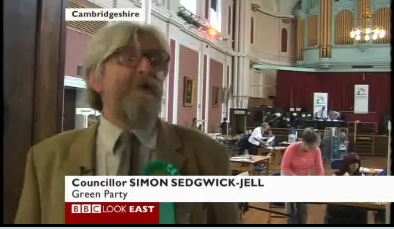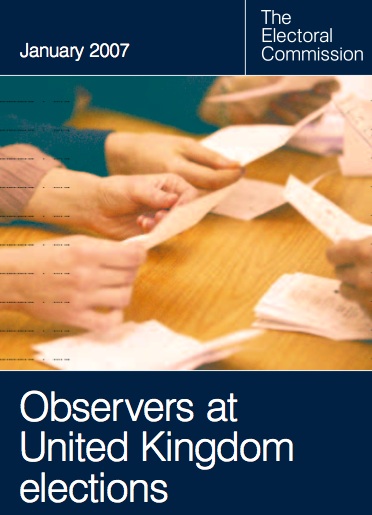I sought accreditation as an electoral observer for the recent elections. Candidates and their agents can observe elements of the elections, and I was informally offered accreditation from a party to observe my local count, however I have no allegiance to any party and decided to follow a route administered by the Electoral Commission instead. This allows anyone who signs a declaration and agrees to abide by a code of conduct to observe various aspects of the election procedure including the count.
On the 12th of April 2009 I asked for information about the application process. A few days later I returned a paper signed copy of the declaration confirming I would abide by the law and maintain the secrecy of the ballot, along with an application form, I received a confirmation this had been received by the commission on the 8th of May 2009. On the 29th of May I submitted the remaining elements of my application by email. Admittedly this was a bit late, but the reason for waiting until just before the election was an attempt to keep the period of my registration as short of possible due to the existence of a draconian code of practice which states:
Observers must maintain strict political impartiality at all times, including during their leisure time. They must not express or exhibit any bias or preference in relation to national authorities, political parties, candidates, referendum issues or in relation to any contentious issues in the election process.
The accompanying guidance for both individuals and organisations states: “Observers are bound by this guidance for the period of their accreditation” and:
All individuals entered on the register will be issued with identification from the Commission. The identification will contain a photograph and will clearly indicate that the individual is an individual observer. Such identification will be valid until 31 December of the year of issue; this will be specified on the identification card.
The guidance makes no reference to canceling accreditation, and from the published list of observers it can be seen that prior to the June 2009 election period no-one had either obtained an accreditation for a period shorter than until 31 December of the year of issue, or canceled their accreditation early. I decided to take the risk that it ought be possible to cancel accreditation; and even if the Electoral Commission refused it is not an offence to breech their code of practice and I felt it would be morally acceptable to do so (and start discussing the state of the traffic again!) if I had attempted to cancel my accreditation and returned any card.
For the recent election I note that the commission, according to their published list of observers, enabled representatives of the Pan-African Parliament and the Republic of Korea Electoral Commission as well as one individual, Paul Kirby, to register as observers for only the period of the June 2009 elections. I have written to the commission asking them not to continue to process my application and at the same time suggested that the option to become accredited for a specific period of time be made available to all. This would have made me, for example, happy to complete a full application form well in advance of the election. I also suggested they re-consider the need for such a draconian code of practice.
I understand why the code of conduct exists, but it is more suited to an international election observation mission than for those wishing to observe an election in their own country. I believe those who express views or allegiances ought be allowed to observe the electoral process, as long as they maintain the secrecy of the ballot I do not see a problem. Not expressing views or allegiances while observing, or while on a mission abroad is quite different to signing up to the draconian code of practice. I think it is wrong that those who wish to express a view on “any contentious issues” in the election process; which in Cambridge would be even a banal comment about the traffic, are not able to observe the election process.
I am personally uncomfortable with bureaucracies which require individuals to sign forms to confirm they will comply with the law, but in the case of election counts I can see it would be a useful mechanism to ensure people are aware of their responsibilities if those allowed to enter a count had to sign to say they were aware of the relevant law. I can’t see why there needs to be any further restriction though. Section 6E of the Political Parties, Elections and Referendums Act 2000 as inserted by Section 29 of the Electoral Administration Act 2006 allows returning officers to limit the number of observers attending at any one time.
Openness and Media Coverage

BBC Look East covered the Cambridgeshire count for literally a few seconds, interviewing Simon Sedgwick-Jell, an ex-Labour Cambridge City Councillor who has won the Abbey ward county seat for the Green party. Some councils make an effort to publicise the arrangements for members of the media to attend election counts. I have not been able to find such guidance on the Cambridgeshire county council or Cambridge City council websites. Neither contains details of the location and time of counts for any of the elections which were held on the 4th of June 2009. Local journalist and blogger Ellee Seymour has revealed on Twitter that a political reporter from a local regional paper is unaware of Sunday’s European count location and how to get in. I think it is important that all local media (including independent media) are aware of the election counts and how they can report on them. There was also a discussion on the cam.misc newsgroup started by someone asking when the counts were to take place. Such information ought be more easily accessible.
I do have a faith in our electoral system, despite the results showing more votes than voters published today for the County Council elections in Cambridge, the postal vote rigging in 2005, and the fact the system relies on me being the first person to turn up at the polling station claiming to be me on election day (admittedly backed by the threat of jail if someone was to impersonate me). As with many areas of public life in the UK, more openness and transparency will, I believe, drive improvement.

5 responses to “Suggesting Improvements to Election Observation in the UK”
Calum Morrell has left an annotation on my freedom of information request on WhatDoTheyKnow.com he has written:
I found the electoral commission’s guidance, checklist and application form internally inconsistent. I was unsure how the hard copy and digital photo were to be submitted at the same time. I had read their guidance and application form prior to making my request. I accept I ought to have also read their checklist, I did not, I did not expect that to contain the information it does.
I do not think it was inappropriate to ask for this information via an FOI request. I do not believe there ought be any difference between a “routine” request for information and an FOI request. A FOI request does not have to cite the act, all requests for information ought be dealt with according to its provisions.
One reason for my approach was an assumption that the Electoral Commission would very precisely adhere to its guidelines and procedures. Their registration of an individual for a period other than “to the end of the year” is a clear indication they do not and are in fact are more flexible than their published information indicates.
I believe it is important for official organisations to publish details of where flexibility exists in order to remove any appearance of (or actual) special treatment of particular people.
If it is any consolation, the count was the dullest, slowest affair I can recall. Those European papers took an age to verify (and even longer to sort into piles on Sunday). I reckon you just saved yourself two days of useful living by not turning up …
I have received an email from the Electoral Commission stating :
As ever cause and effect is hard to determine but two of the matters I highlighted, and lobbied on, have now been addressed by the latest Electoral Commission proceedures:
http://www.electoralcommission.org.uk/find-information-by-subject/elections-and-referendums/upcoming-elections-and-referendums/observing-elections-and-referendums